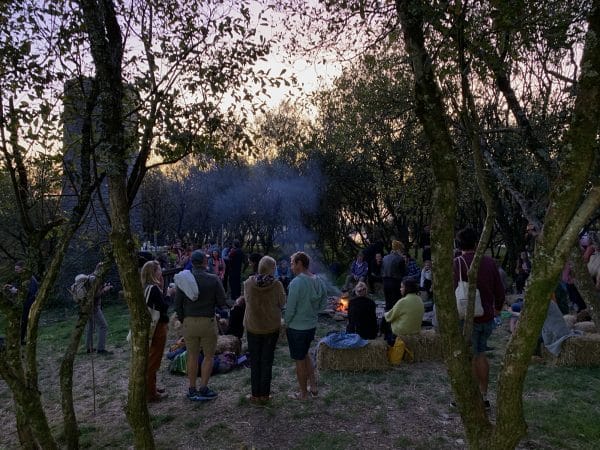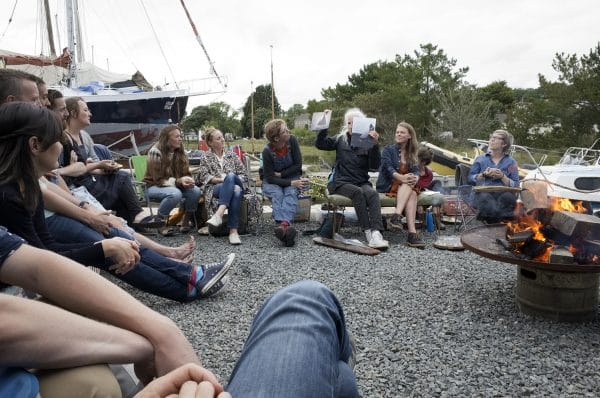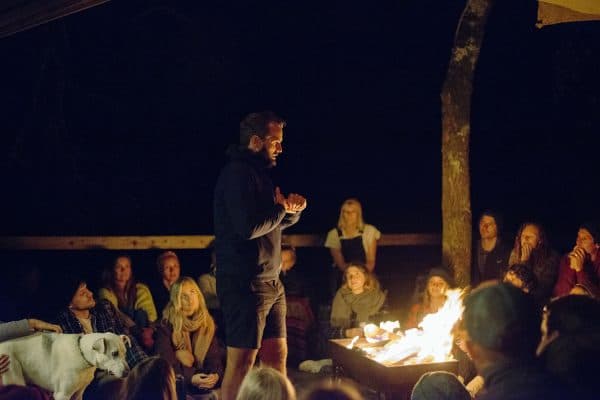
Watching the sun set over a shining sea, and, many miles south, the moon rise over the river. A clamour of rooks rising from the treetops around the quay, an owl calling from the dark woods in an abandoned quarry. Stories, readings, poems, piss-taking; we’ve heard tales of starting a community farm, surfing with sharks, a brother and sister’s razor-sharp banter, a 12-year-old girl sailing solo with an exhausted swallow for company, setting up a home in Cornwall for a family of Syrian refugees, and the practicalities of filming sex scenes on a Monday morning. Different stories, settings and listeners; always fire, stellar company and burnt marshmallows.
As the rain lashes the windows and summer’s fireside gatherings fade into memory, three random musings float to the surface:
Gazing into the flames enhances how we articulate our ideas.
Petrel Rum’s Elle Demaus admitted this was her first time speaking in public, and she was nervous. But there’s something reassuring about fire; watching warm, careening flames dissolve the formal structures of speaker and audience, inviting questions, observations and encouragement. She spoke candidly and straight from the heart about her journey into rum distillation, getting a license (the hardest thing by far), restoring and living aboard an old 1900s pilot cutter, and why the rich, smooth ‘hearts’ are really the only bits from the rum distillation process to use. Naturally, the fire fuelled memories, stories, confessions and – combined with a shot of delicious maple and rosemary infused rum for one and all – hearty conversations afterwards.
Archipelagos of imagination, icebergs of stories.

Beautifully recounting three poignant stories of loss in the fading light, theatre-maker and performer Sue Hill gave us a fascinating glimpse into the creative mind and devising process of her late partner and collaborator, Bill Mitchell of Wildworks. Walking us through and passing around objects from his incredible attic, we learned how everything from an old plastic bottle filled with meltwater from a Patagonian glacier, to a huge box of scissors, to a lifelong collection of snow globes, sparked ideas for stories, characters and imaginary worlds… but that what we saw, Bill’s theatrical outputs, were only the tiny islands that surfaced in this “archipelago of imagination”, while a huge unseen mass of objects, connected ideas, notes, observations, sketchbooks and unfinished stories lurked beneath the water.
This image also connects with a theory about writing that we heard Chris Power discuss at Kudhva. Ernest Hemingway’s ‘iceberg theory of omission’ asserts that a writer should focus on the surface elements without openly discussing the underlying themes, which should shine through implicitly. “If a writer of prose knows enough of what he is writing about he may omit things that he knows and the reader, if the writer is writing truly enough, will have a feeling of those things as strongly as though the writer had stated them,” Hemingway wrote in Death in the Afternoon. “The dignity of movement of an iceberg is due to only one-eighth of it being above water.”
Images tell slippery truths.

Drawing striking parallels between the way we edit our lives for social media and the way young fighters pose for war photographers/ the international media, Guy Martin led us through his observations and experiences of shooting the Arab Spring in Egypt and Libya for the Wall Street Journal – ending in an incident which killed his two closest colleagues and nearly cost him his own life. Constantly questioning the images we accept as reality, the way we consume and share news, the powers pulling the strings, and the stereotypes we unwittingly perpetuate, Guy went on to find the world of Turkish soap opera to be his most eye-openingly truthful experience of Middle Eastern culture yet (the subject of his new book, The Parallel State).
Thanks to all our speakers for giving their time so generously, Sharps for keeping us in delicious cold beer (their Offshore Pilsner = officially voted the world’s best lager, in fact), and all the listeners who have ventured with us into the dusk to see the world a bit differently.
Sign up to our newsletter to be the first to hear about the 2020 season.